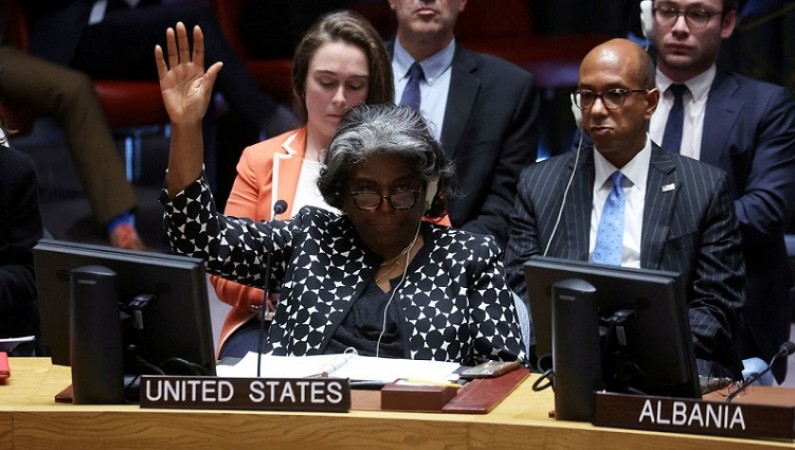
In a contentious move, the United States exercised its veto power in the United Nations Security Council on Wednesday to block a resolution aimed at condemning Hamas' actions against Israel and calling for a temporary halt in hostilities to allow humanitarian aid into Gaza. The vote saw the US as the sole dissenting voice, with 12 council members voting in favor of the resolution, while Russia and the United Kingdom opted to abstain from the vote.
US Ambassador to the United Nations, Linda Thomas-Greenfield, defended the decision, stating, "We are on the ground doing the hard work of diplomacy. We believe we need to let that diplomacy play out."
The resolution, originally drafted by Brazil, sought to condemn violence against all civilians. However, the US contended that it did not adequately emphasize Israel's right to self-defense. This move was consistent with the US's historical practice of using its Security Council veto to shield Israel from critical resolutions.
Al Jazeera's correspondent, Kristen Saloomey, reporting from the UN headquarters in New York City, noted that the majority of the council supported the resolution. She expressed disappointment that the council couldn't come together after days of negotiations, especially as the humanitarian situation in the region was rapidly deteriorating.
This veto occurred amidst escalating tensions in the region. A deadly explosion at a Gaza hospital on Tuesday, which Palestinian authorities attribute to an Israeli air raid, led to widespread outrage. Israel, in contrast, claimed that the explosion resulted from a rocket misfire by the Palestinian Islamic Jihad (PIJ) armed group, an assertion denied by the PIJ.
The United States asserted that its analysis, based on "overhead imagery, intercepts, and open source information," indicated that Israel was not responsible for the attack. The US vowed to continue collecting evidence, though Al Jazeera could not independently verify these claims.
Despite uncertainty regarding the explosion's cause, protests across the Middle East have raised concerns that other armed groups may join the Israel-Hamas conflict.
UN Middle East peace envoy Tor Wennesland, addressing the Security Council, warned that the world was "at the brink of a deep and dangerous abyss that could change the trajectory of the Israeli-Palestinian conflict, if not of the Middle East as a whole."
The recent attack by Hamas into southern Israel on October 7, which resulted in the deaths of hundreds of Israeli civilians and the capture of 199 individuals, received widespread condemnation. Israeli authorities reported that at least 1,400 people, mostly civilians, were killed in the attack, with more than 4,400 others injured.
Critics have accused Western countries, particularly the US, of applying a double standard when it comes to potential violations of international law. While the US has urged Israel to take measures to minimize civilian casualties, it has provided firm support and offered little direct criticism, even as Israeli airstrikes devastate Gaza neighborhoods and a siege disrupts access to water, food, electricity, and fuel for Gaza's 2.3 million residents.